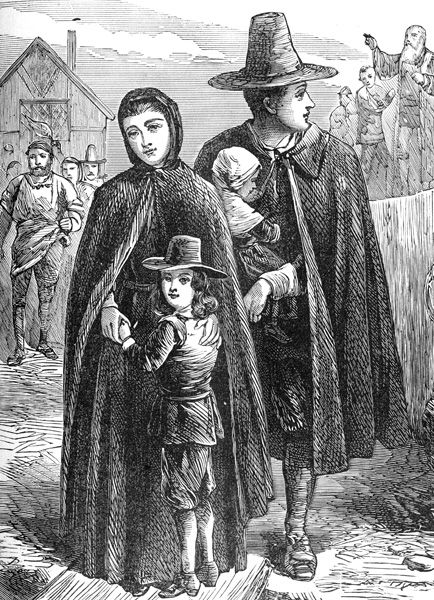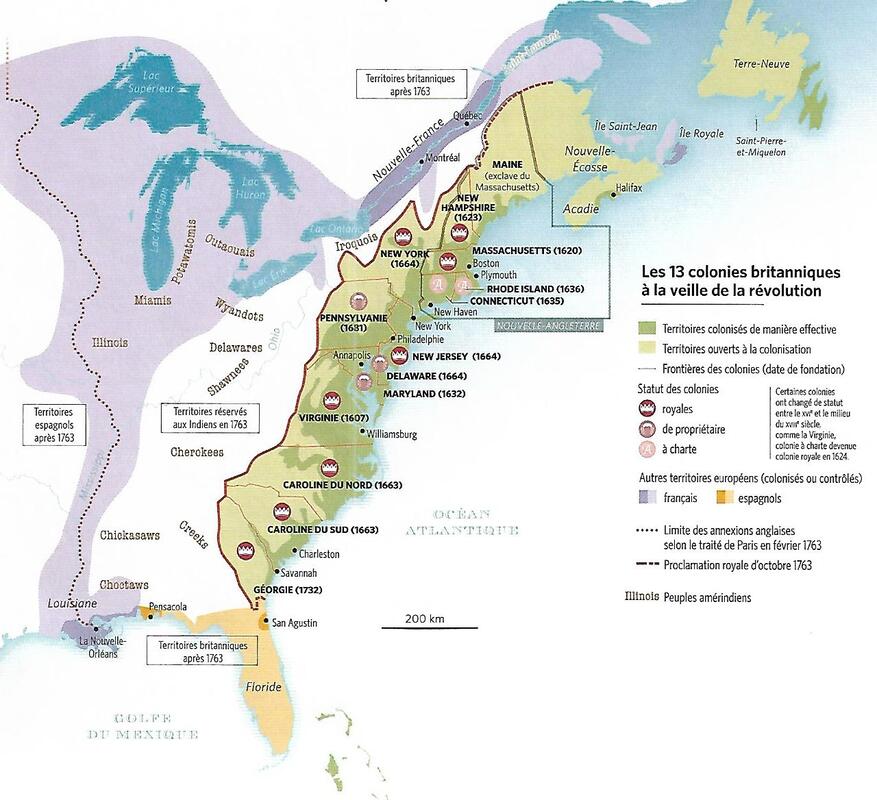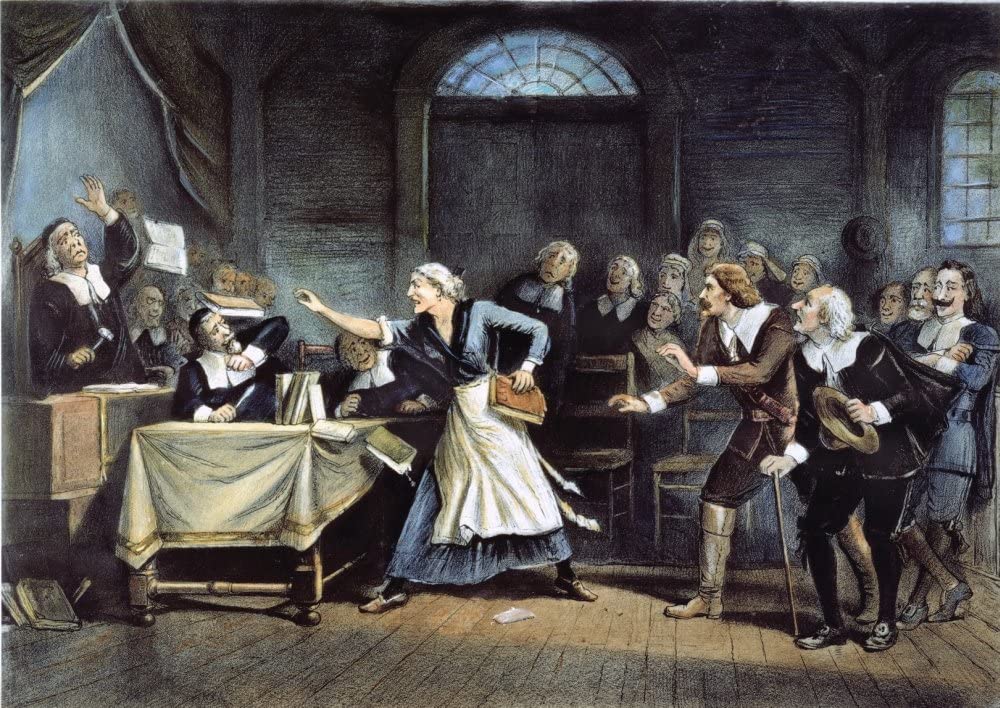American Civilization | The Salem Witch Trials
|
|
Introduction | How do people usually portray witches?
We usually [souvent] portray [depict] witches as old grumpy [grincheuse] women dressed in black outfits everyday. They often carried [carry = transporter] a broom [un balai] and had black cats. They had ugly features such as an ugly and pointed nose as well as [ainsi que] a deeply lined face [un visage marqué par les rides].
In the 17th century [siècle], old women who presented those characteristics were often accused of being witches. That was the case, especially, when they seemed [seem = sembler] to be rather mysterious, unfriendy [unsociable] or nasty [mean]. Furthermore [Moreover, Plus], if [si] they were not religious [Puritans] or did not attend [fréquenter] church regulary, and if they lived in remote areas [places], they were labelled as witches and ran serious risks of being killed.
It is also important to say that many Native Americans [Indians / Indigenous People] were often accused of witchcraft [sorcellerie]
In the 17th century [siècle], old women who presented those characteristics were often accused of being witches. That was the case, especially, when they seemed [seem = sembler] to be rather mysterious, unfriendy [unsociable] or nasty [mean]. Furthermore [Moreover, Plus], if [si] they were not religious [Puritans] or did not attend [fréquenter] church regulary, and if they lived in remote areas [places], they were labelled as witches and ran serious risks of being killed.
It is also important to say that many Native Americans [Indians / Indigenous People] were often accused of witchcraft [sorcellerie]
A | Background information and Salem
Votre navigateur ne prend pas en charge l’affichage de ce document. Cliquez ici pour télécharger le document.
A | The Puritans of Massachusetts [ Extracts from the book "A Storm of Witchcraft"]
Le texte extrait du livre "A Storm of Witchcraft : The Salem Witch Trials and the American Experience" de Emerson W. Baker (Oxford University Press)
|
| ||||||||||||
Télécharger le même document mais commenté
|
| ||||||||||||
The founders of Massachusetts were part of [faisaient partie de] a group called « The Puritan Diaspora ». They left The United Kingdom between 1620 and 1640 to settle [s’installer] in the colony of Massachusetts. They left Britain because they were oppressed by the King and persecuted for their different religious beliefs [croyances].At the time the king was James I [the first] and his successor Charles I [the first]. The Puritans wanted the colony of Massachusetts to be ‘a shining example’ [un brilliant exemple] of what the world should [devrait] could [pourrait] be (if everybody was Puritan). The kind of [type de] life that the Puritans led [lead = mener] was one of simplicity, austerity and piety for the church. They were devoted [dévoués] for the Puritan church.
The Puritan movement began in England in latter part of the 16th century : "Its adherents believed that the creation of the Church of England (Anglican Church) by Henry VIII (the eighth) had not been a strong reform of Catholic corruption"
|
The Puritans did not all agree or find an agreement [trouver un accord] on what their religious practice should be [ought to be].
The people called ‘separatists’ believed that the Church was corrupt that they had break with it completely and start again from scratch in the New World. [start from scratch = recommencer de zéro]. The Puritans in Massachusetts were not ‘seperatists’ – rather, they believed the Church could be saved. |
All Puritans agreed on the fact that they were Calvinists, and ‘they believed that all people were born as sinner into a life of total depravity.’ The only thing Puritans could hope [espérer] for was that God would one day reveal himself and make them ‘Saints’.
Catholics believed that people could go to heaven if they performed good deeds [faire de bonnes actions] and led a moral life. However [cependant], Puritans could do nothing to change God’s decision because God made his decision even before a person was born. [make a decision = prendre une décision].
Puritans also believed that it was important to read the Bible regularly. As a consequence, New England had one of the highest literacy rates in world by the 18th century.
Catholics believed that people could go to heaven if they performed good deeds [faire de bonnes actions] and led a moral life. However [cependant], Puritans could do nothing to change God’s decision because God made his decision even before a person was born. [make a decision = prendre une décision].
Puritans also believed that it was important to read the Bible regularly. As a consequence, New England had one of the highest literacy rates in world by the 18th century.
B | The Beginning of The Salem Witch Trials [ Extracts from "Haunted History"]
|
Vous pouvez faire l'exercice intéractif de compréhension orale en cliquant-ici
|
|
|
|
Leçon
The town of Salem (Massachusetts) was established [founded] in 1626. At the time, it was regarded as a thriving farming and fishing community. People in Salem lived a simple life of hard work and Puritan faith. In 1692, this Puritan zeal and austerity turned into fear for Salem’s inhabitants. |
Those frightening events all started in the home [household] of Salem’s esteemed church leader [minister], Samuel Parris. Indeed, both daughter (Betty) and his niece (Abigael Williams) presented the first affliction. The had convulsions and as one Salem village Archivist said: ‘These girls were under a malady that scared the hell out of a lot of people. (…)'
For example [for instance], they would [would fréquentatif] run towards the fireplace as if to burn themselves up’. [would fréquentatif]. In some cases, it is even reported [forme passive] that bite-marks occured on their bodies. The family used home remedies because they were really sick, but in vain. Then they decided to call in doctors [physicians] and they prayed for them. The afflicitions were so terrifying and abnormal that many people thought they had to be supernatural. One of them said that they were under an evil hand, which means ‘a curse’ (witchcraft).
For example [for instance], they would [would fréquentatif] run towards the fireplace as if to burn themselves up’. [would fréquentatif]. In some cases, it is even reported [forme passive] that bite-marks occured on their bodies. The family used home remedies because they were really sick, but in vain. Then they decided to call in doctors [physicians] and they prayed for them. The afflicitions were so terrifying and abnormal that many people thought they had to be supernatural. One of them said that they were under an evil hand, which means ‘a curse’ (witchcraft).
“Most historians agree that Samuel Parris was the person who hardened the factions and ultimately galvanized them into action. (…) Under his leadership, the tensions and divisions in Salem heightened”. (page 95) "A Storm of Witchcraft : The Salem Witch Trials and the American Experience" de Emerson W. Baker (Oxford University Press)
C | The Salem Witch Trials [ Text from History.com]
|
Le texte et la vidéo
| |||||||
D | The Salem Witch Trials in Popular Culture [ Extract from The Simpsons]
If any factor links all of the accused, it has to be religion.
The trials were largely an effort to bolster Puritanism. Many of the accused were perceived as posing a threat to the religious order, either because they were true outsiders, were Puritans who challenged Reverend Parris’s effort to build a community of true believers, or were associated with non-Puritan religious practitioners, including Quakers, Baptists, Catholics, and Native Americans. A number of the accused were authority figures – ministers, politicians, militia officers – but somehow seen as responsible for spiritual decline and a threat to the Puritan existence. (page 126) "A Storm of Witchcraft : The Salem Witch Trials and the American Experience" de Emerson W. Baker (Oxford University Press)
E | Pour aller plus loin ... "Religion in Colonial America"
Votre navigateur ne prend pas en charge l’affichage de ce document. Cliquez ici pour télécharger le document.
F | Pour aller encore plus loin ... "Religion in The United States"
Consulter ce cours en cliquant-ici



